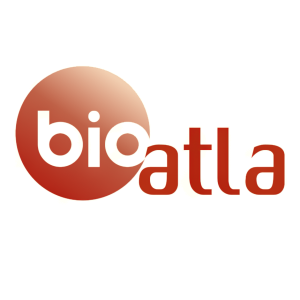BioAtla Presents Promising Interim Data from its Phase 1 Trial with BA3182 in Patients with Treatment Refractory Metastatic Adenocarcinoma at ESMO 2025
Rhea-AI Summary
BioAtla (Nasdaq: BCAB) reported preliminary Phase 1 results for BA3182, a dual‑conditionally binding EpCAM x CD3 bispecific T‑cell engager, presented at ESMO 2025 (Oct 19, 2025). In a 35‑patient, heavily pretreated cohort (median 3 prior lines), BA3182 showed a confirmed partial response (cPR) at 0.6 mg in intrahepatic cholangiocarcinoma with >6 months without progression and prolonged tumor control at doses ≥0.6 mg. Safety was manageable: only 2 cytokine release syndrome events and reversible, transient liver analyte elevations; dose escalation continues and the maximally tolerated dose is not yet defined.
Positive
- Confirmed partial response (cPR) at 0.6 mg, >6 months without progression
- Manageable safety with only 2 cytokine release syndrome cases
- Prolonged tumor control observed at doses ≥0.6 mg
- Dose escalation ongoing; maximally tolerated dose not yet defined
Negative
- Three observed dose‑limiting toxicities (transient and reversible)
- Transient G4 ALT and G3 neutropenia reported at higher doses
- Efficacy interim data based on small subcohorts (e.g., 7 CRC scans)
News Market Reaction
On the day this news was published, BCAB declined 26.00%, reflecting a significant negative market reaction. Argus tracked a trough of -22.3% from its starting point during tracking. Our momentum scanner triggered 33 alerts that day, indicating elevated trading interest and price volatility. This price movement removed approximately $17M from the company's valuation, bringing the market cap to $49M at that time. Trading volume was very high at 3.0x the daily average, suggesting heavy selling pressure.
Data tracked by StockTitan Argus on the day of publication.
- Adverse events (AEs) generally transient and readily manageable; only 2 cases of cytokine release syndrome (CRS)
- Prolonged tumor control with increasing doses of BA3182; confirmed partial response (cPR) at 0.6 mg in a patient with intrahepatic cholangiocarcinoma without progression for >6 months
- Maximally tolerated dose not yet defined; dose escalation continues; currently testing 1.8 mg dose level
SAN DIEGO, Oct. 20, 2025 (GLOBE NEWSWIRE) -- BioAtla, Inc. (Nasdaq: BCAB), a global clinical-stage biotechnology company focused on the development of Conditionally Active Biologic (CAB) antibody therapeutics for the treatment of solid tumors, today announced preliminary clinical data from a Phase 1 study of BA3182 during a poster presentation titled “Preliminary Results from a First-in-Human Phase 1 Study of BA3182, a Dual-Conditionally Binding Biologic (CAB) EpCAM x CD3 Bispecific T-cell Engager in Patients with Treatment Refractory Metastatic Adenocarcinoma” at the European Society for Medical Oncology (ESMO) Congress 2025, held in Berlin, Germany. The poster was featured in the Investigational Immunotherapy session on Sunday, October 19.
EpCAM is broadly expressed among adenocarcinomas of the colon, stomach, pancreas, biliary tract, lung, breast, prostate, and thyroid, making it a compelling bispecific T-cell engager (TCE) target when reliably restricting antibody binding in the tumor microenvironment (TME). EpCAM is also broadly expressed on healthy epithelial tissues, and this broad expression is associated with on-target, off-tumor toxicities when targeted by traditional antibodies. BA3182 is a dual-conditionally binding bispecific TCE targeting EpCAM and CD3, designed to selectively bind within the acidic TME, and eliminate on-target, off-tumor toxicity.
“We continue to observe encouraging preliminary prolonged tumor control and a manageable safety profile with our dual-CAB EpCAM x CD3 bispecific TCE that combines, and thereby multiplies, the binding selectivity of the CAB targets for directing the body’s T-cells to kill cancer cells, while protecting healthy tissues,” said Jay M. Short, Ph.D., Chairman, Chief Executive Officer and co-founder of BioAtla, Inc. “BA3182 has tremendous promise across a broad range of adenocarcinomas with the potential to serve over one million patients globally.”
Key Highlights from the Poster Presentation
BA3182 demonstrates a manageable safety profile with preliminary evidence of antitumor activity
- 35 patients were dosed subcutaneously with BA3182 once weekly; all but one received 1 or 2 priming doses 4 to 7 days prior to treatment (as of September 10, 2025)
- Patients were heavily pre-treated receiving a median of 3 prior lines of therapy (range 2 to 9)
- Patients treated at the 0.6 mg dose level received a greater number of doses, mean of 11+ doses, relative to all preceding lower doses, with 7 patients presently continuing on therapy.
Safety
- BA3182 priming and first treatment doses were associated with transient and reversible elevations in hepatic analytes, consistent with cholestasis, that resolved with ongoing, higher treatment exposures
- Minimal, transient, low-grade CRS observed to date (G1, N=1; G2, N=1)
- Priming dose of 0.1 mg safely enabled scheduled delivery of higher continuing treatment doses
- Observed DLTs (N=3) were transient and reversible, enabling continued treatment
- 0.1 mg prime followed by 0.3 mg treatment dose observed G3 non-febrile neutropenia possibly related to tocilizumab; dose escalated to 0.6 mg with no neutropenia recurrence
- 0.3 mg prime followed by 0.6 mg treatment dose observed transient G4 ALT
- 0.6 mg prime followed by 1.2 mg treatment dose observed reversible G3 diarrhea associated with concomitant CMV enteritis; no diarrhea recurrence upon BA3182 rechallenge with 0.6 mg and continuing treatment
- No treatment-related deaths occurred; only one patient discontinued treatment due to an AE
- Safety profile supports continued dose escalation; maximally tolerated dose not yet defined
Preliminary assessment of efficacy
- Response-evaluable patients included those with at least one scan; preliminary assessment of anti-tumor activity demonstrated prolonged tumor control with increasing doses of BA3182
- For those treated with BA3182 at doses of 0.6 mg and higher (N=24):
- 14 CRC patients: among 7 patients who had one scan, 5 achieved stable disease (SD) at 1st scan
- 6 pancreatic cancer patients: 2 had SD at 1st scan, and 2 continued treatment beyond potential pseudo-progression
- 2 cholangiocarcinoma patients: 1 achieved a cPR and 1 is pending first scan
- 1 Adenoid Cystic Carcinoma (ACC) patient experienced SD; 1 patient with appendiceal cancer withdrew consent before 1st scan
- Among patients treated at higher doses, patients achieved SD at a higher rate and remained on active treatment for prolonged intervals, generally longer than those who received lower doses
A copy of the presentation materials can be accessed on the “Publication” section of the Company’s website at www.bioatla.com.
About CAB-EpCAM x CAB-CD3 Bispecific T-cell Engager Antibody
BioAtla is developing BA3182 as a potential anticancer therapy for patients with advanced adenocarcinoma. BA3182 is a (CAB) EpCAM x (CAB) CD3 bispecific T-cell engager antibody that contains two binding sites for EpCAM and two binding sites for CD3ε. The binding sites for EpCAM and CD3ε have been designed to bind their respective targets specifically and reversibly under the acidic conditions found in the TME and to have reduced binding in the normal alkaline environment outside of the TME. The CAB selective binding to both the CAB EpCAM and CAB CD3ε arms are required to activate the T-cell engagement against the tumor, thus enabling the combined selectivity of each CAB binding arm in the bispecific antibody. BioAtla continues to advance the ongoing Phase 1 study to evaluate the safety, pharmacokinetics, and efficacy of BA3182 in advanced adenocarcinoma patients.
About CAB technology
CAB technology is a proprietary technology engineered to activate only in acidic, inflammatory conditions found in diseased microenvironments, but not in normal tissues. BioAtla utilizes its CAB technology to develop novel, reversibly active monoclonal and bispecific antibodies and other protein therapeutic product candidates. CAB product candidates are designed to have more selective targeting, greater efficacy with lower toxicity, and more cost-efficient and predictable manufacturing than traditional antibodies.
About BioAtla®, Inc.
BioAtla is a global clinical-stage biotechnology company with operations in San Diego, California, and in Beijing, China through its contractual relationship with BioDuro-Sundia, a provider of preclinical development services. BioAtla has extensive and worldwide patent coverage for its CAB platform technology and products with greater than 780 active patent matters, more than 500 of which are issued patents. Broad patent coverage in all major markets includes methods of making, screening and manufacturing CAB product candidates in a wide range of formats and composition of matter coverage for specific products. To learn more about BioAtla, Inc., visit www.bioatla.com.
Forward-looking Statements
Statements in this press release contain "forward-looking statements" that are subject to substantial risks and uncertainties. Forward-looking statements contained in this press release may be identified by the use of words such as "anticipate," "expect," "believe," "will," "may," "should," "estimate," "project," "outlook," "forecast," "has potential to" or other similar words. Examples of forward-looking statements include, among others, statements we make regarding BioAtla’s business plans and prospects; results, progress and timing of our research and development programs and clinical trials; expectations with respect to enrollment and dosing in our clinical trials; and the potential size of the addressable patient population for BA3182. Forward-looking statements are based on BioAtla's current expectations and are subject to inherent uncertainties, risks and assumptions, many of which are beyond our control, difficult to predict and could cause actual results to differ materially from what we expect. Further, certain forward-looking statements are based on assumptions as to future events that may not prove to be accurate. Factors that could cause actual results to differ include, among others: factors that raise substantial doubt about our ability to continue as a going concern and that we will need additional funding to continue development of our CAB technology platform and our CAB product candidates; the risk that preliminary or interim clinical results may not be indicative of results from later cohorts or larger populations; potential delays in clinical and preclinical trials; the uncertainties inherent in research and development, including the ability to meet anticipated clinical endpoints, commencement and/or completion dates for clinical trials, regulatory submission dates, or regulatory approval dates, as well as the possibility of unfavorable new clinical data and further analyses of existing clinical data; whether regulatory authorities will be satisfied with the design of and results from the clinical studies or take favorable regulatory actions based on results from the clinical studies; our dependence on the success of our CAB technology platform; our ability to enroll patients in our ongoing and future clinical trials; the successful selection and prioritization of assets to focus development on selected product candidates and indications; our ability to form collaborations and partnerships with third parties and the success of such collaborations and partnerships; our reliance on third parties for the manufacture and supply of our product candidates for clinical trials; our reliance on third parties to conduct our clinical trials and some aspects of our research and preclinical testing; the accuracy of our estimates regarding addressable patient populations and market opportunity; potential adverse impacts due to geopolitical or macroeconomic events outside of our control, including health epidemics or pandemics; and those other risks and uncertainties described in the section titled "Risk Factors" in our Annual Report on Form 10-K filed with the Securities and Exchange Commission (the “SEC”) on March 27, 2025, our Quarterly Report on Form 10-Q filed with the SEC on May 6, 2025, and August 7, 2025 and our other reports as filed with the SEC. Forward-looking statements contained in this press release are made as of this date, and BioAtla undertakes no duty to update such information except as required under applicable laws.
Internal Contact:
Richard Waldron
Chief Financial Officer
BioAtla, Inc.
rwaldron@bioatla.com
858.356.8945
External Contact:
Joyce Allaire
LifeSci Advisors, LLC
jallaire@lifesciadvisors.com








